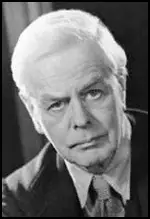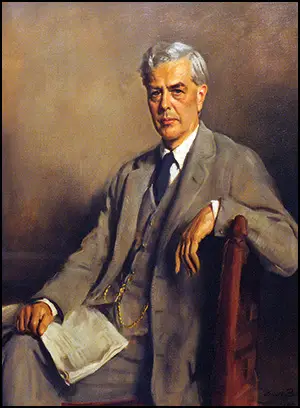Lionel Curtis

Lionel Curtis, the youngest of four children, was born at The Outwoods, near Derby, on 7th March 1872. His father, Revd George James Curtis, was rector of Coddington church, in Herefordshire. His parents were evangelical Christians and followers of Robert Pearsall Smith and it has been claimed that Curtis "inherited their evangelical fervour".
Curtis was educated at Haileybury College and New College. While at Oxford University he became interested the ideas of Frederick Denison Maurice and the Christian Socialist movement. After leaving university he managed a boys club in the East End of London. He then found work as private secretary to Reginald Welby, vice-chairman of the London County Council. According to Richard K. Morris: "While working for the London County Council in the 1890s he had sometimes adopted the life of a tramp, begging for food and sleeping in workhouses, the better to understand the problems of London's underclass."
On the outbreak of the Boar War in October 1899, Curtis enlisted in the City Imperial Volunteers. He was discharged following the capture of Pretoria, in June 1900. In October he joined the staff of Sir Alfred Milner, as assistant imperial secretary. His biographer, Alex May, has pointed out: "One of his tasks was to draw up a plan for the new Johannesburg municipality, and in April 1901 he was appointed acting town clerk. The appointment of someone so young and inexperienced was widely criticized, but over the next two years Curtis's hard work and organizing ability won him the admiration of many former critics. The apprehension that he would serve the interests of the wealthy mine owners was soon confounded: indeed, it was largely through Curtis's persistence that the boundaries of the new municipality were drawn to include the mines."
Curtis was only one of a number of young Oxford graduates whom Milner had recruited to work in the administration of the new colonies. William Thackeray Marriott described them as "Milner's Kindergarten". The group included John Buchan, Geoffrey Dawson, Richard Feetham, Fabian Ware, Robert Brand, Basil Temple Blackwood, Patrick Duncan, Geoffrey Robinson Dawson, Philip Kerr and John Hanbury-Williams. All the men saw the unification of South Africa as the key to economic prosperity. In February, 1903, Curtis was promoted assistant colonial secretary of the Transvaal, with responsibility for municipal affairs. His plan to restrict Indian immigration brought him into conflict with Mahatma Gandhi.
By June 1909 a constitution for South Africa had been agreed, and Curtis returned to England to lobby for its passage unamended through the House of Commons and the House of Lords. In August parliament passed the South Africa Act, and on 31st May 1910 the Union of South Africa was established. the High Commissioner for South Africa, William Waldergrave Palmer, the 2nd Earl of Selborne, wrote to Curtis that "the main credit for this work must always be yours".
In September 1909, Curtis helped Sir Alfred Milner establish the Round Table. According to Alex May "The aim of the Round Table was deceptively simple: to ensure the permanence of the British empire by reconstructing it as a federation representative of all its self-governing parts. Curtis depicted this as the logical outcome of the movement towards self-government in the dominions, and the only alternative to disruption and independence." Curtis was appointed General Secretary on a salary of £1,000 a year. Other members included Leo Amery, Robert Cecil, Geoffrey Dawson, Philip Kerr, Reginald Coupland, Edward Grigg and Alfred Zimmern.
Curtis went on a tour of the dominions - South Africa, New Zealand, Australia and Canada. On his return he wrote up his plans for into imperial federation. Curtis believed that it should be done straight away but other members argued that it would be counter-productive to go to fast. Others disagreed with his insistence that any imperial government should have the power of direct taxation, and that India and the dependencies should come under the control of the dominions as well as of Britain. Curtis also controversially argued that the empire existed in order to promote self-government, in the dependencies as well as the dominions.
In 1916 Curtis published The Commonwealth of Nations (his historical examination of the empire and of the principle of self-government) and The Problem of the Commonwealth (the argument for a federation of the empire). Curtis immediately set out on a tour of the dominions, to arrange for local publication and stimulate debate. Unfortunately for Curtis, members of most Round Table groups were opposed to the ideas put forward in the books. However, his proposals received a more favourable welcome in India when he visited the country in 1917. The resultant Government of India Act of 1919 differed in several respects from Curtis's original proposal but incorporated the most important element of his scheme.
Curtis now became a strong supporter of international government in the form of the League of Nations and attended the Paris Peace Conference. In 1919 he was the main figure behind the establishment of Institute of International Affairs in London. He became secretary of the organization and also helped the formation of the Council on Foreign Relations in New York City.

In June 1921 Curtis published an influential article advocating the ending the Anglo-Irish conflict by giving the fullest measure of dominion self-government to the south. As a result Curtis was appointed as second secretary and constitutional adviser to the British delegation at the Anglo-Irish Treaty talks of October to December 1921, and as adviser to the colonial secretary on Irish affairs until October 1924.
Lionel Curtis took a keen interest in the Far East and in 1932 published The Capital Question of China. In 1935 he unsuccessfully attempted to persuade the British government to hand over control of its South African protectorates to South Africa, arguing that only by having responsibility for all the consequences of their policies would they "come round to a more liberal view". His views on the subject appeared in The Protectorates of South Africa (1935).
During the Second World War Curtis published a series of pamphlets advocating immediate federation between the British Commonwealth, the United States, and the surviving Western democracies. In his books, World War - Its Cause and Cure (1945), The Master-Key to Peace (1947) and The Open Road to Freedom (1950), Curtis argued that atomic power and the Cold War had brought a federation of the Western democracies within the realm of practicable possibilities. Leonard Cheshire arranged a meeting with Curtis. He later recalled: "He (Cheshire) came to see me about what he felt was really important, which is to get a move on among ex-servicemen for winning the peace... He very sensibly went on to say that it was no use preaching a faith to ex-servicemen until they had something to live on."
Curtis joined the executive committee of United Europe in 1947, and attended the Hague conference in 1948, where he argued for a wider framework of federation which would include the British Commonwealth and the United States. His work for international peace was recognized by his nomination for the Nobel Peace Prize in 1947. His biographer, Alex May has argued: "His influence was at its height in the years before, during, and immediately after the First World War, largely as a result of his contacts through the Kindergarten and Round Table. In later years he ploughed a more lonely furrow, and came almost to relish his image as a prophet scorned."
Lionel Curtis died at his home in Kidlington on 24th November 1955.
Primary Sources
(1) Richard K. Morris, Cheshire (2000)
Sometime in the autumn of 1945 Cheshire read Curtis's book World War - Its Cause and Cure. The book impressed him. So did Curtis's record of action. While working for the London County Council in the 1890s he had sometimes adopted the life of a tramp, begging for food and sleeping in workhouses, the better to understand the problems of London's underclass. He next enlisted as a private soldier to fight in South Africa, emerging from the ranks to assist Lord Milner in shaping the Union of South Africa. Later still he helped to draft the Irish constitution, and in the 1930s it was Curtis who expounded the concept of the Commonwealth.

